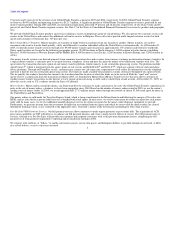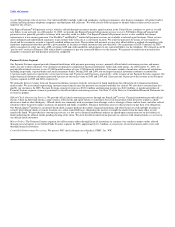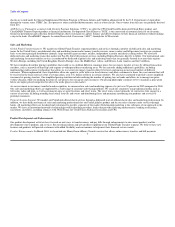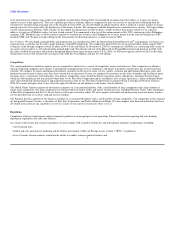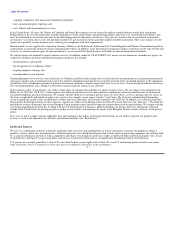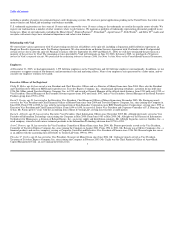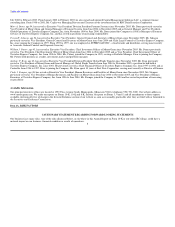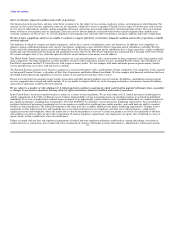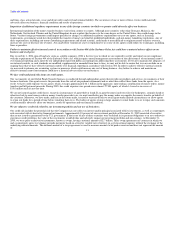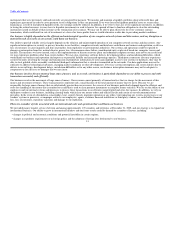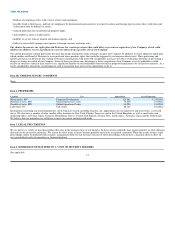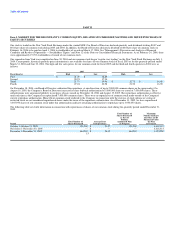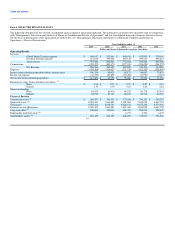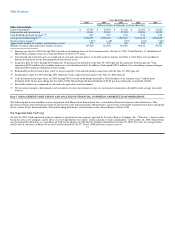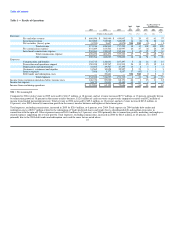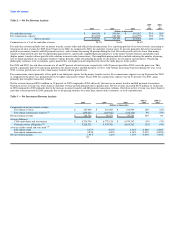MoneyGram 2005 Annual Report Download - page 15
Download and view the complete annual report
Please find page 15 of the 2005 MoneyGram annual report below. You can navigate through the pages in the report by either clicking on the pages listed below, or by using the keyword search tool below to find specific information within the annual report.
Table of Contents
exposure to credit loss. At any point in time, depending upon many factors including the interest rate environment and the fixed and variable rates of the swap
agreements, we may owe our counterparty or our counterparty may owe us. If any of our counterparties to these swap agreements were to default in its
payment obligation to us or otherwise experience credit problems, we could be adversely affected.
Our financial condition and results of operations could be adversely affected by fluctuations in interest rates.
We derive a substantial portion of our revenue from the investment of funds we receive from the sale of payment instruments, such as official checks and
money orders, until these instruments are settled. We generally invest these funds in long-term fixed-income securities. We pay the financial institutions to
which we provide official check outsourcing services a commission based on the average balance of funds produced by their sale of official checks. This
commission is generally calculated on the basis of a variable rate based on short-term financial indices, such as the federal funds rate. In addition, we have
agreements to sell, on a periodic basis, undivided percentage interests in some of our receivables from agents at a price that is discounted based on short-term
interest rates. To mitigate the effects of interest rate fluctuations on our commission expense and the net proceeds from our sales of agent receivables, we
enter into variable-to-fixed rate swap agreements. These swap agreements require us to pay our counterparty a fixed interest rate on an agreed notional
amount, while our counterparty pays us a variable interest rate on that same notional amount.
Fluctuations in interest rates affect the value and amount of revenue produced by our investment portfolio, the amount of commissions that we pay, the net
proceeds from our sale of receivables and the amount that we pay or receive under our swap agreements. As a result, our net investment revenue, which is the
difference, or "spread," between the amount we earn on our investment portfolio and the commissions we pay and the discount on the sale of receivables, net
of the effect of the swap agreements, is subject to interest rate risk as the components of net investment revenue are not perfectly matched through time and
across all possible interest rate scenarios.
Certain investments in our portfolio, primarily fixed-rate mortgage-backed investments, are subject to prepayment with no penalty to the borrower. As interest
rates decrease, borrowers are more likely to prepay fixed-rate debt, resulting in cash flows that are received earlier than expected. Replacing the higher-rate
investments that prepay with lower rate investments could reduce our net investment revenue. Conversely, an increase in interest rates may result in slower
than expected prepayments and, therefore, cash flows that are received later than expected. In this case, there is risk that the cost of our commission payments
may reprice faster than our investments and at a higher cost, which could reduce our net investment revenue.
Material changes in the market value of securities we hold may materially affect our results of operation and financial condition.
We also bear market risk that arises from fluctuations in interest rates that may result in changes in the values of our investments and swap agreements. Rate
movements can affect the repricing of assets and liabilities differently, as well as their market value. Stockholders' equity can be adversely affected by
changing interest rates, as after-tax changes in the fair value of securities classified as available-for-sale and after-tax changes in the fair value of our swaps
are reflected as increases and decreases to a component of stockholders' equity. The fair value of our swaps generally increases when the market value of
fixed rate, long-term debt investments decline and vice versa. However, the changes in the fair value of swaps and investments may not fully offset, which
could adversely affect stockholders' equity.
The market values of securities we hold may decline due to a variety of factors, including decline in credit rating of the issuer or credit issues related to
underlying collateral of the security, general market conditions and increases in interest rates for comparable obligations. If we determine that an unrealized
loss on a security is "other-than-temporary," the loss becomes a realized loss through an impairment charge in the income statement.
Our business may require cash in amounts greater than the amount of available credit facilities and liquid assets that we have on hand at a particular
time, and if we were forced to ultimately liquidate assets or secure other financing as a result of unexpected liquidity needs, our earnings could be
reduced.
We are subject to risks relating to daily liquidity needs, as well as extraordinary events, such as the unexpected loss of a customer. On a daily basis, we
receive remittances from our agents and financial institution customers and we must clear and pay the financial
12


